SANEF, MMA and the SOS: Support public broadcasting coalition unhappy that Critical Infrastructure Bill allows for security vetting of SABC journalists
3 July 2018
The South African National Editors’ Forum (SANEF), Media Monitoring Africa (MMA) and the SOS: Support Public Broadcasting Coalition (SOS) are unhappy that the latest draft of the Critical Infrastructure Protection Bill (replacing the Apartheid era, National Key Points Act, 1980) does not address the question of vetting of editorial staff of the Public Broadcaster, the SABC (currently a National Key Point and likely to be designated as “critical infrastructure” once the Bill becomes law). We believe this is a serious oversight which renders the Bill unconstitutional for violating the right to freedom of expression which is protected under section 16(1) of the Constitution of the Republic of South Africa.
In our view, the Parliamentary Portfolio Committee of the Police, dealing with this Bill, has overlooked the crucial informational role that the SABC plays in informing the nation of news and current events. We believe it is imperative that the editorial staff, that is, the journalists and editors of the national public broadcaster, the SABC, operate without hindrance, including unnecessary intimidation by the State Security Agency.
We believe it is essential therefore that the Bill be amended to protect both:
-
the expression rights of the editorial staff at the national public broadcaster which are specifically protected in terms of section 16(1)(a) of the Constitution which protects the expression rights of the press and other media; and
-
the right to receive information or ideas by the broader South African public which right is specifically protected by section 16(1)(b) of the Constitution.
In the most recent High Court judgment to opine on the importance of the role of the SABC, SOS and Others v SABC and Others[1] Matojane J held at paragraphs:
[31] as follows:
Section 16 enshrines the right of the public, there is the SABCs audience, to be able to access information and ideas so that they can enjoy their rights. The freedom to receive or impart information or ideas relates to the right of the SABC to communicate without interference, but also the right of the broader public to have access to the broadcast media.
And at [47] as follows:
As with the investigative agencies tasked with probing corruption and abuses of power, such as the Directorate of Priority Crimes Investigation (DPCI or the Hawks) and the Independent police insisted good of directorate (IPID), the SABC must be free from executive control and influence to be able to perform its function.
We are of the view that the Committee has to take note of the dangers to the SABC that are posed by the current version of the Bill. It is self-evident that intimidation of SABC journalists and other editorial staff has a chilling effect on their ability to broadcast material that is in the public interest. The Bill must be amended to prevent this.
In our view, the following clause must be inserted into the Bill to avoid successful constitutional challenges being made thereto once enacted:
“Specific Protections for the SABC as the independent public broadcaster
In recognition of the vital role that the SABC, the independent public broadcaster, plays in ensuring that the public has access to a wide range of news and information, nothing in this Act shall require the security vetting, other than of the SABC’s security staff, of the SABC staff, in particular, no journalist or non-security staff member shall be required to disclose any communication undertaken in the course of his or her employment and sources of journalistic information as a result of the SABC being declared critical infrastructure and/or a critical infrastructure complex.”
SANEF, MMA and SOS urge the Committee to apply their mind to the Constitutional problems we have raised.
Issued by Katekani Chabalala, Office Administrator, South African National Editors’ Forum (SANEF), 3 July 2018

